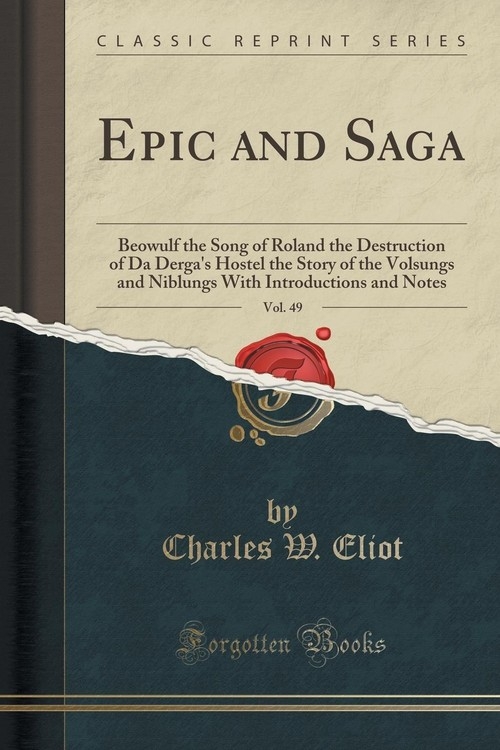Epic and Saga, Vol. 49 Beowulf the Song of Roland the Destruction of Da Derga's Hostel the Story of the Volsungs and Niblungs With Introductions and Notes (Classic Reprint)
Eliot Charles W.
Epic and Saga, Vol. 49
Beowulf the Song of Roland the Destruction of Da Derga's Hostel the Story of the Volsungs and Niblungs With Introductions and Notes (Classic Reprint)
Eliot Charles W.
- Wydawnictwo: FB &c Ltd
- EAN: 9781330391129
- Ilość stron: 474
- Format: 15.2x22.9cm
- Oprawa: Miękka
Niedostępna
Opis: Epic and Saga, Vol. 49 - Eliot Charles W.
Excerpt from Epic and Saga, Vol. 49: Beowulf the Song of Roland the Destruction of Da Derga's Hostel the Story of the Volsungs and Niblungs With Introductions and Notes
When our Teutonic ancestors migrated to Britain from the Continent of Europe, they brought with them the heroic songs which their minstrels were accustomed to celebrate the deeds of their kings and warriors. In Section xvi of "Beowulf" will be found a short description of the recitation at a feast of this kind of lay. Perhaps as early as the seventh century of our era, after the introduction of Christianity, an unknown poet gathered material from these lays and composed the epic of "Beowulf." Besides the stories, he took from the older songs their metrical form and many features of style; but how far he retained their actual language there is no longer any means of knowing. A good deal of comment and reflection he must have added; and the structure of the epic is certainly due to him. He did not sing or chant to a harp as his predecessors in the treatment of this material had done; he wrote a book to be read. "Beowulf" is thus not folk-song, but belongs to a much more conscious and developed stage of art than the popular ballad.
The exploits narrated in the poem belong to the life of Germanic peoples before they crossed the North Sea, and at least one of the characters can be identified with a historical personage. Hygelac was the Danish king Chochilaicus, who was killed in a raid into the countries near the mouth of the Rhine, not far from 520 A.D.; and as he was the uncle of Beowulf, this fixes approximately the date for the historical prototype of our hero. But the events of the poem are legendary, not historic. The fights with monsters and dragons, which occupy so much of the poem, are clear evidence of the large extent to which the marvels of popular tradition had attached themselves to figures whose historical identity had already become shadowy. Some scholars have even tried to interpret the persons and events of the poem as mythology; and while one can not deny that mythical elements may have become interwoven, yet the poet believed his hero to be thoroughly human, and his foes to be such ghosts and monsters as are still believed in by the peasantry in many parts of Europe.
About the Publisher
Forgotten Books publishes hundreds of thousands of rare and classic books. Find more at www.forgottenbooks.com
This book is a reproduction of an important historical work. Forgotten Books uses state-of-the-art technology to digitally reconstruct the work, preserving the original format whilst repairing imperfections present in the aged copy. In rare cases, an imperfection in the original, such as a blemish or missing page, may be replicated in our edition. We do, however, repair the vast majority of imperfections successfully; any imperfections that remain are intentionally left to preserve the state of such historical works.
Szczegóły: Epic and Saga, Vol. 49 - Eliot Charles W.
Nazwa: Epic and Saga, Vol. 49 Beowulf the Song of Roland the Destruction of Da Derga's Hostel the Story of the Volsungs and Niblungs With Introductions and Notes (Classic Reprint)
Autor: Eliot Charles W.
Wydawnictwo: FB &c Ltd
Kod paskowy: 9781330391129
Języki: angielski
Ilość stron: 474
Format: 15.2x22.9cm
Oprawa: Miękka

























